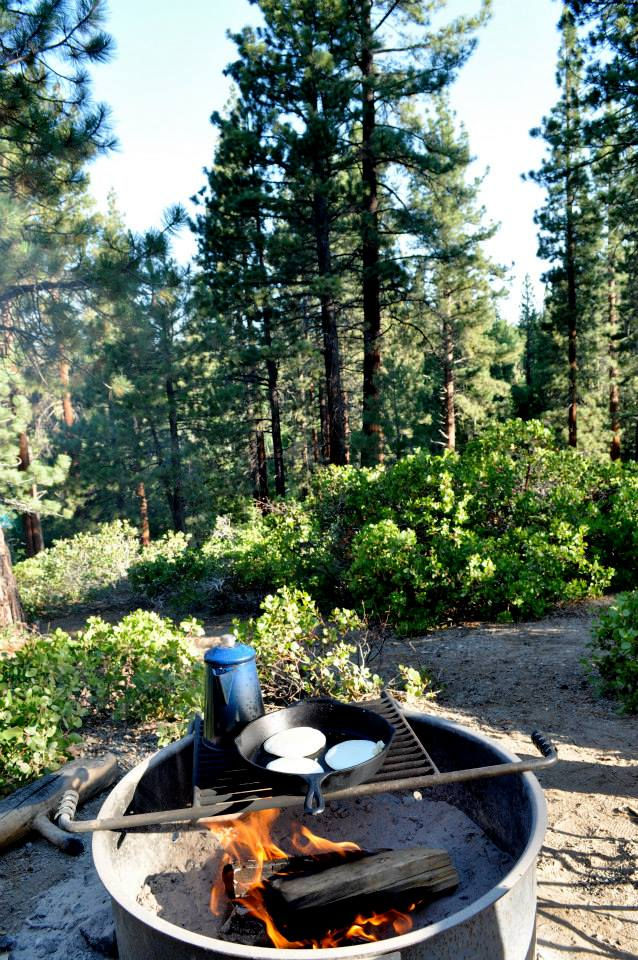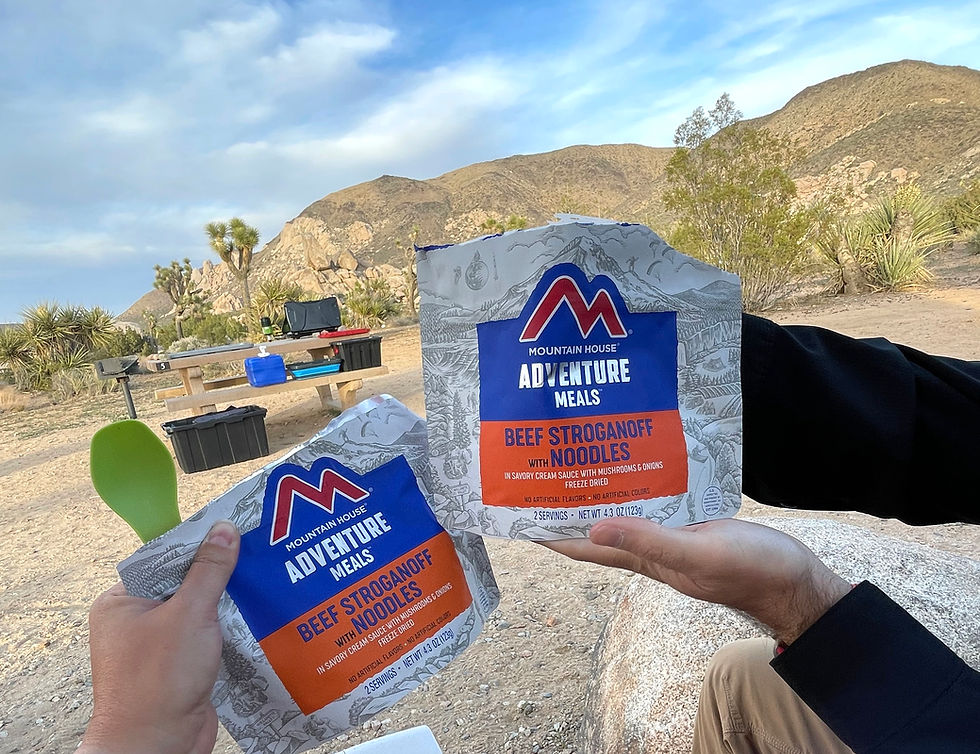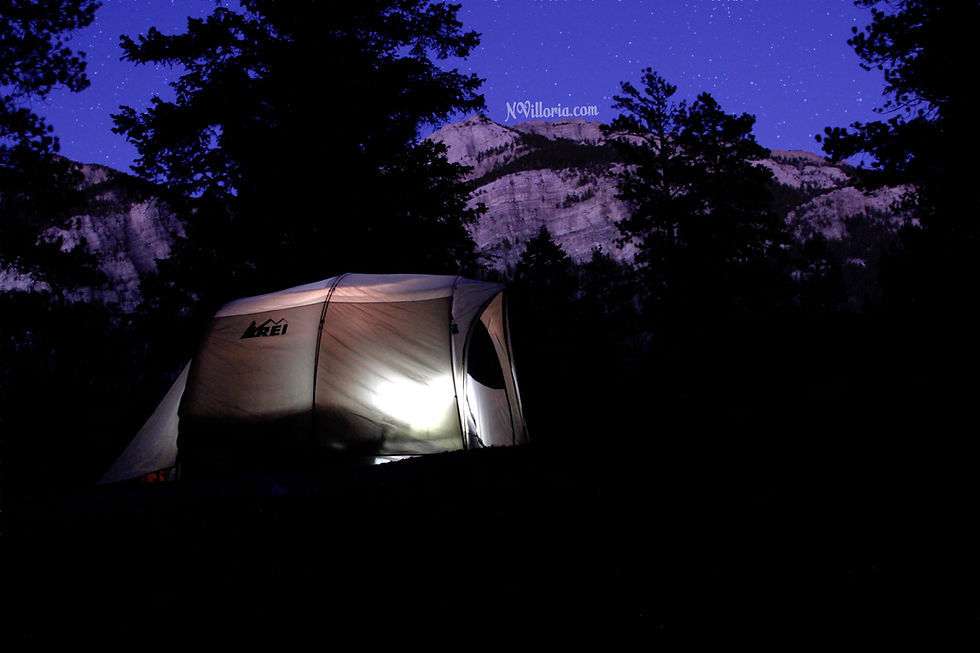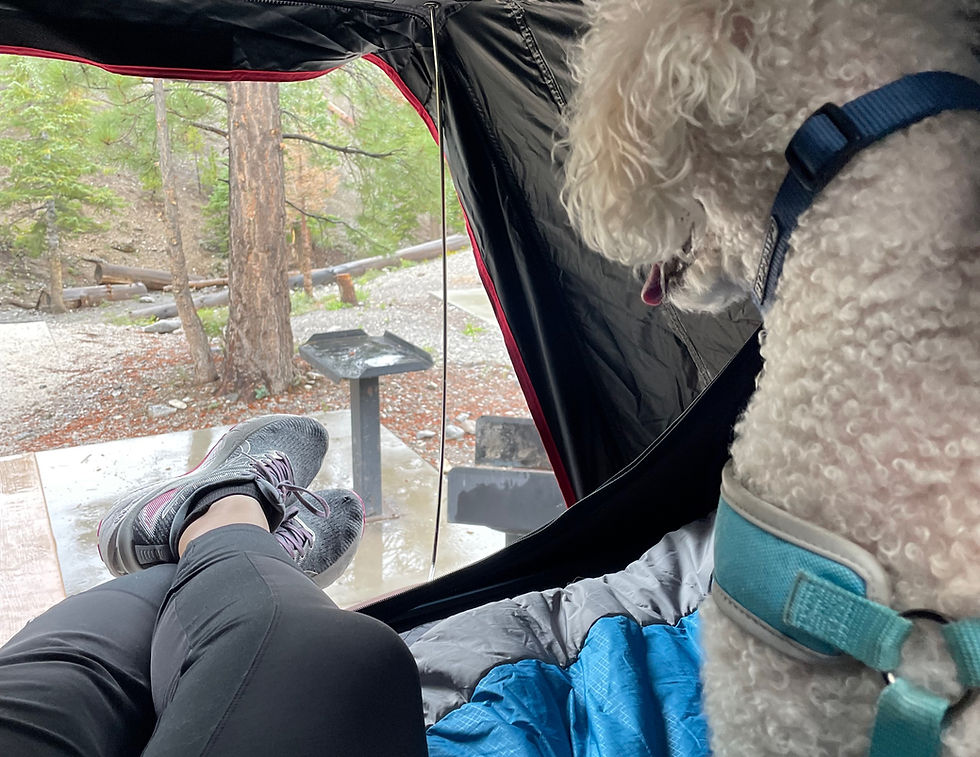Camping for Beginners: Gear, Tips, and How to Survive Your First Trip
- Nikki Emord
- Nov 22, 2025
- 11 min read
If we ever meet and you rave about the newest nightclub on The Strip or a recent reality TV episode, I'll probably smile and nod, mentally having no desire to ever check either out for myself. But if you pour your heart out about that primal need to disconnect from civilization, sleep under the stars, and breathe in the scent from the wind-blown trees, then you’ve found a kindred spirit and I completely understand that lure.
Camping for beginners can feel intimidating, but if you're feeling ready to unplug and reconnect with yourself and the natural world around you, you’ve come to the right spot.
To begin, let’s be clear; no single gear checklist is the "Camping Bible." Your camping gear depends entirely on your adventure (car camping in winter, backpacking in summer, tent camping in monsoon season) and your own personal comfort baseline (for me, a designated bathroom is non-negotiable).
My first camping trip, my gear included a tent, a cooler of food and drinks, a flashlight and a sleeping bag.

My first camping trip when I was first dating my now husband, we upgraded slightly and had a tent, two sleeping bags, two camp chairs, a cast-iron pan, and a single bucket to hold dirt for extinguishing our fire.
Looking back, I can't help but laugh. While that's far from my packing list now, back then it was enough to enjoy a night out under the stars, even if we were waking up freezing and huddling over a fire waiting for smokey pancakes to cook.
Camping for Beginners: The Non-Intimidating Guide to Gear and Planning
Whether you're upgrading from a humble bucket-and-cast-iron kit or you’ve genuinely never slept outside a hotel, consider the following suggestions a flexible guide, to help you navigate gear selections, avoid basic rookie mistakes, and truly enjoy (and survive) your first trip.

Finding Your Campground:
Your first camping trip should be about easing into things, not conquering the primitive backcountry on a multi-day thru-hike. Start out by staying somewhere local, preferably an established campground and plan for one or two nights max. Not only will this help minimize stress but if you wake up in the middle of the night and realize camping is not your idea of a good time, you can pack up and drive home. When searching for established campgrounds look for ones that have amenities. Choose a developed campsite that offers creature comforts like flush toilets and running water and that allow you to reserve your site in advance. These type of campsites also typically include a picnic table, fire ring and/or charcoal grill, cleared tent pad and parking spot.
Essential Camping Gear for Beginners
For the sake of this blog, when I say camping I’m not talking about the fancy glamping setups, you’re here because you want to learn to camp remember!? Below are the foundational items that separate an enjoyable night off the grid from a sleepless time of shivering and misery:
Shelter (The Tent):
Over time you can always size down for your needs but to start, use a tent with a capacity rating larger than you or however many are sharing a tent with you. Not only will lit provide you with enough space to organize your things and spread out when you sleep but you’ll enjoy being able to stand up to change clothes. Use a footprint or tarp underneath your tent to protect the floor of your tent and help prevent water from seeping through the tent floor if it’s a wet environment.

Pro Tip: if you are anticipating getting to your campsite later in the afternoon, practice setting up your tent before your actual camping trip to ensure you have all the parts and know how to so you aren’t struggling to read instructions outside in the dark when you could be enjoying a campfire or dinner.
Other tent accessories that are nice to have are vestibules outside the doors for storing muddy shoes or providing extra protection in rain, snow or wind. Also, a small outdoor rug by the door to wipe your boots off can help prevent tracking dirt onto your sleeping bag. Additionally, look at packing a small hammer or rubber mallet to drive your tent stakes into the ground.
Pro Tip: When pitching your tent, consider where the sun rises and where the campfire will be located and face the door of your tent accordingly. Either toward from the morning sun if you like to have your screen open to watch the sunrise, or away from the fire to avoid filling your tent with smoke.
Sleep System (Sleeping Bag & Pad):
A good sleeping bag can make all the difference on a camping trip. Look for a bag that has a good temperature rating to ensure you will be warm enough during the night and always err on the side of caution by getting a warmer bag than you think you’ll need.
The most underrated piece of gear when it comes to sleeping is a good sleep pad. From inflatable to closed cell foam mats, these not only provide you with extra comfort but can stop the cold ground from stealing your warmth at night. Like the sleeping bag measurements, be sure to check the R-value of the pad and look for one that will accommodate cooler temperatures to keep you warm.
One additional item that isn’t necessarily an essential but is definitely a game changer for me is a sleeping bag liner. Not only will this help keep your bag clean but can also provide you with extra warmth.
Pro Tip: If you are camping in the winter or very cold conditions, you can bring hand warmers to pop into your hoodie pocket or fill a Nalgene bottle with boiling water to have in your sleeping bag to keep you warm at night.
Light (Headlamps are King):
Yes, my first camp lighting setups were bulky flashlights and heavy lanterns that required six D batteries, but a headlamp is your new best friend when it comes to being outdoors at night. Not only does it free up your hands but extra settings can provide a red light option to save your night vision for star gazing and avoid attracting bugs.
Food and Cooking:
When it comes to dining outdoors, food management is important. Don’t be that camper that wakes up in the morning realizing the only thing you have is an extra 6-pack, a bottle of vodka and a bag of chips (yes, we have seen those campers, it’s not a pretty sight.)
For an overnight, almost any cooler will do as long as there is enough space to store your perishable food and plenty of drinks (hydrating ones as well as adult beverages if you choose to enjoy a happy hour in the outdoors). To keep your food cold, preemptively freeze water bottles to serve as ice packs as these can also serve as potable water as they defrost. It’s a good rule of thumb to bring a gallon of water per person per day you plan on being outside.

For cooking, a number of stove options are available, but to start, a classic two-burner propane camp stove will give you the space to boil water and cook simultaneously if needed. Be sure to bring an extra fuel canister, just in case, and don’t forget a lighter!
Meal options are ultimately your choice. You can bring the fixings for a fancy fettuccine alfredo or fresh asada tacos, or simplify things with rehydrated backpacker meals, which ever route you choose just make sure you have all the tools needed to cook, clean and serve your meals as well as dispose of any packaging or unwanted leftovers (if there is such a thing). It’s also a good idea to always bring extra dry food items like granola bars, just in case your cooking plans go south and you find yourself needing a backup plan for meals.
For food storage in bear country, most established campgrounds will have bear vaults for you to lock up your food and cooler in, but if not be sure to have a bear-proof food vault to prevent rodents and furry camp visitors from stealing your food supply during the night. Even if you aren’t in bear country, campgrounds are full of furry and feathery food critics who are accomplished raiders. Always keep your food sealed in durable hard plastic bins that can be locked in your car or a bear vault at night and never leave food or trash out unattended. Even if it’s just for a few minutes, a hungry squirrel will be more than happy to jump onto your picnic table to chew through a ziplock bag to eat your PB&J sandwich.

Pro Tip: Keep your kitchen tools (stove, fuel, plates, sporks, etc.) in a designated storage bin for easy storing and access.
Additional items that can come in handy, either for yourself or neighboring campers are a can opened, bottle opener, matches (as a backup), silicon measuring cup, pot holder and extra long handled spoons (for backpacker meals).
Pro Tip: Don’t forget the cleanup! Biodegradable soap, pan scraper, sponge, drying towels a small wash basin and extra trash bags go a long way and make cleanup much easier than storing dirty dishes to take back home to clean.
Campfire Basics
If you’re new to camping there’s no doubt you’re going to want to enjoy the traditional campfire and even try roasting some s’mores. Remember Smoky Bear and pay attention to proper fire safety. If a designated fire ring or pit exists, use it! If not, follow local regulations to ensure you have a clear and safe area away from tents, plants, and structures.

Extinguish your fire at night and when you leave camp. Remember that bucket I mentioned that I started with? When you are done with your fire, the goal is to make sure your fire is drowned, stirred, and cool to the touch before you leave it unattended (even just to go for a walk around the campground). The embers can stay hot for hours and reignite so use your due diligence to ensure the next forest fire isn’t because of your negligence. I have lost count on the number of camp fires I have put out from campers who simply left because they didn’t want to take the time to extinguish it properly before going home!
Pro Tip: To avoid campfire smoke and ensure fire safety, try using a portable propane firebox when camping. Not only can you turn the fire on and off as desired but you, your clothes and your gear won’t be smelling like camp fire for the foreseeable future.
If you're looking for a bit more comfort than a concrete or wooden picnic table bench, which most establish campgrounds have, look into bringing a foldable camp chair which you can position around your campsite for the most relaxing location with the best views.
What to Wear:
Choosing the right clothing options is key to staying comfortable and warm when camping, and layers is key! While cotton is comfortable, once it gets wet either from sweat, rain or dew, it’s slow to dry and can lead to a cold and miserable time. Instead, pack moisture-wicking materials as your base layers, a fleece or down option as a mid layer and have a waterproof shell or jacket as an outer layer for when the weather inevitably shifts and deals you rain or windy conditions.
When it comes to footwear, bring sturdy hiking shoes and a warm slip-on shoe that can be easily slipped on and off for those midnight bathroom trips.
Pro Tip: Since most of our body heat escapes through our head, pack a beanie to slip on at night or even sleep in if it’s extra cold. Also bring an extra pair of socks for the daytime (in case your first pair gets wet from sweat or water) and a warm pair for at night. Glove liners can also be helpful for those brisk mornings when you’re trying to make breakfast before the sun is fully up.
Click here to view a list of some of my favorite outdoor apparel items.
Toiletries:
This is subjective. Yes, you can bring everything you use at home, the face soap, the hair brush, the makeup, the deodorant and body spray, but do you need it? Honestly, when it comes to toiletries, pack whatever makes you feel comfortable and clean.
Pro Tip: Ziplock Bags. I promise you they seem like a random unneeded item, but you will find yourself grateful you have a few extra laying around when you need to store and dispose of trash, food, wipes or paper products.
In addition to your desired toiletry items, be sure to also pack a first-aid kit stocked with bandages, antiseptic wipes, and any personal medication. Sunscreen and bug defense are also a helpful item, even when you don’t think you’ll need them.
For hygiene essentials there are some items I always make sure I have with me on any trip. The first being extra toilet paper, because the truth is, campground restrooms occasionally run out or the rolls are not in any condition you want to use. Bring your own travel-sized soap, a hand towel, and a full roll of toilet paper (stored in a waterproof bag, just in case it’s ever needed). Hand sanitizer is always a well appreciated item as is cleansing wipes which can be used to wipe down your face or whole body after a long day of hiking so you can go to sleep feeling refreshed. For the ladies, your body doesn’t care if you’re camping and it’s inconvenient, if it’s that time of the month it’s going to happen. Bring extra hygiene products, cleaning wipes and even a few pairs of period underwear that can keep you feeling comfortable and leakproof throughout the night.
Like food, most toiletries have a scent, so be sure to securely store it how you would your food at night and when it’s not in use to ensure no unwanted critters get into your things.
Pro Tip: Instead of lathering up your limbs with sunscreen and feeling sticky throughout your camping trip, try wearing sun hoodies to protect your skin and leave you feeling clean.
Camper Courtesies (The Unwritten Rules)
Yes, when you camp you are setting up a space to enjoy, but nature is shared space, so act like a good neighbor to other people and to the local wildlife residents.
Leave No Trace:
The most important thing to remember is to practice Leave No Trace. This is the core principle of all outdoor exploration. Whatever you pack in, you must pack out. This includes food scraps, wrappers, and even the "biodegradable" things. Remember that all trash goes in a bag, and that bag goes into a dumpster or it goes home with you. It’s also good practice to leave your site cleaner than you found it. If the previous sampler left trash or the wind blew some in, pack it up before you leave and throw it away properly.
Quiet Hours:
Yes, you should absolutely respect the posted quiet hours (more often than not those tend to be 10 PM to 7 AM). But be curious and keep voices, music, and setup/teardown noise to a minimum at all times. People go to nature to escape the everyday sounds and encounters and enjoy the tranquility of nature, they didn’t book a campground to listen to you blasting your music, hear your family members screaming, or listen to you live out your Paul Bunyan fantasy and chop down every conceivable piece of firewood in the vicinity. (Yes, we have had all these experiences, and each one was less than ideal, to put it politely.)
Limit Your Light Pollution:
When escaping the city, you seek darkness, which is why excessive artificial light, or light pollution, is disruptive. It’s common courtesy to never shine your headlamp or flashlight directly into a neighboring campsite, or light up your campground with every LED lantern you can get your hands on. To fully enjoy stargazing and safely move around your campsite, do what you can to preserve your natural night vision, a process that takes up to 30 minutes to develop. Bright white or blue light destroys this night vision instantly, forcing your eyes to reset. Strive to use the dimmest light setting or the red light on your headlamp which will allow you to see without losing your ability to navigate in the dark.

Hopefully you found this blog to be helpful and you are now armed with the knowledge to upgrade your trip from a humble bucket-and-cast-iron operation to a comfortable, well-managed adventure.
The most important thing to remember is things will happen. You will inevitably forget something, the weather won’t cooperate or you’ll have some fluke experience you never thought of, which is why proper preparation is essential. The tent might take an hour to set up, you might forget a lighter, and it will probably rain when the forecast promised sun. If you are well prepared and can go into things ready to roll with whatever comes your way, you’re bound to be just fine.
The goal isn't perfection; it's disconnection to reconnect. So secure your campsite, double-check your headlamp batteries, and get ready to trade the glare of the city lights for the unmatched spectacle of a million stars.
The wilderness is waiting. Go enjoy the quiet.





Comments